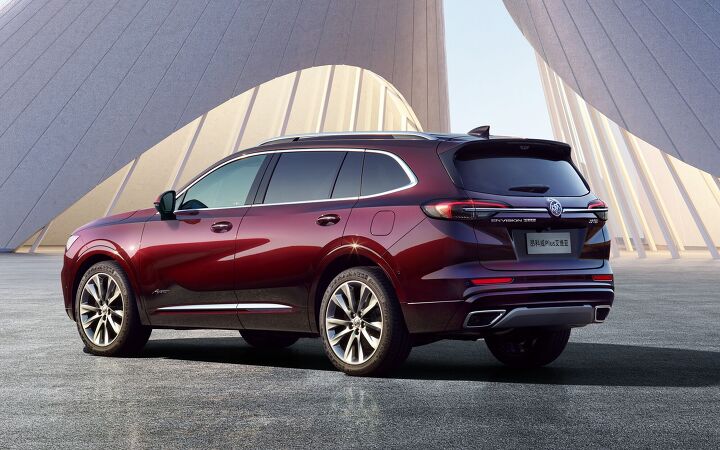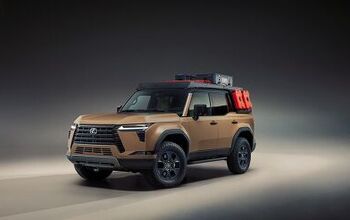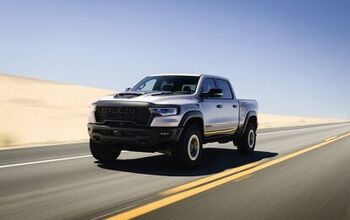Senate Bill Seeks to Tariff Chinese Vehicles Out of Existence

This week, Senator Josh Hawley (R-MO) is introducing legislation to increase tariffs on imported Chinese vehicles this week with the stated goal of dealing with the “existential threat posed by China.”
The bill seeks to raise the base tariff rate from 2.5 percent to 100 percent, including vehicles owned by Chinese-based automakers that are assembled in places like Mexico. With Chinese exports already under a 27.5 percent tariff, the changes would effectively make those products prohibitively expensive.
However, this is not exclusively a Republican issue. Both parties have been worried about China’s industrial prowess spelling trouble for Western automakers. While reporting on the proposed legislation, Reuters noted that a bipartisan group of lawmakers practically begged U.S. Trade Representative Katherine Tai to increase tariff rates last November. The plan included adding import taxes on Chinese vehicles assembled in Mexico, even though the USMCA (and NAFTA before that) would have normally given them preferential treatment.
From Reuters:
Tai said last month the Biden administration is closely reviewing "China's non-market policies and practices in its automotive industry" and reviewing current tariff levels. Tai said she is concerned about Chinese vehicle exports noting high U.S. tariffs "have also encouraged Chinese firms to set up operations outside China."
On Friday, a U.S. manufacturing advocacy group urged Biden to block low-cost Chinese autos and parts from Mexico.
"The introduction of cheap Chinese autos - which are so inexpensive because they are backed with the power and funding of the Chinese government — to the American market could end up being an extinction-level event for the U.S. auto sector," the Alliance for American Manufacturing said in a report.
Hawley has correctly identified that there’s been an influx of Chinese-made automobiles onto Western nations of late. Chinese automakers have signaled a desire to tackle the American market, in a manner similar to South Korea and Japan, for years. A decade ago, those efforts looked pointless. Chinese products were frequently relegated to inexpensive and undesirable spaces at automotive trade shows featuring models that would have never been competitive here.
This is no longer the case. Chinese-made vehicles are becoming increasingly popular around the world and are starting to make up a meaningful percentage of the cars bought by our nearest neighbors. For example, over half of the General Motors vehicles sold inside Mexico are actually assembled in China. You might even be familiar with some of these models because a couple were formerly available in the United States until government regulations and industry profitability calculations made them difficult to rationalize.
Remember the Chevrolet S10 (pictured below) and Cavalier? Despite having vanished from our roads, you can still purchase both as Chinese imports sold in Mexico. The Chevy Tornado, Onix, Groove, Captiva, and Sail are other Mexican models assembled in China.
This is also taking place in the United States, albeit at a slower pace. The Buick Envision and Lincoln Nautilus are both assembled in China and exported here. Volvo’s EX30 will likewise be a Chinese export. The proposed legislation would presumably make those models unaffordable to American consumers unless production is shifted elsewhere.
With General Motors so deeply intertwined with Chinese manufacturing and influential in regard to U.S. policy, it’s bound to complicate the proposed legislation. Although, if we are being truly objective, most automotive brands are already reliant on Chinese labor to some degree due to the way industry supply chains have been structured. The entire premise of a domestically produced automobile basically doesn’t exist in the modern era and arguably hasn't for decades.
While the Biden administration does not appear particularly concerned with Chinese influence, and has arguably advantaged the Asian nation by subsidizing electric vehicles, it has attempted to prioritize more domestic manufacturing by pouring money atop the relevant industries via the so-called Bipartisan Infrastructure Law and Inflation Reduction Act. But this has not prevented further integration between domestic automakers and China. Meanwhile, citizens continue grumbling about unfettered government spending and the subsequent monetary inflation.
By contrast, Donald Trump has made combating Chinese imports a central aspect of his reelection campaign as China continues promoting itself as the next global purveyor of affordable automobiles. Unfortunately, his big move seems to be more-or-less what Senator Hawley has proposed in the bill — stalling Chinese automakers from breaking into our market through high import taxes while headway is made elsewhere in the world.
That’s not really much of a long-term solution if the end goal is to beat China at its own game. However, Trump has also repeatedly indicated a desire to deregulate various domestic industries in a bid to make them more competitive. In 2020, he suggested that manufacturers pivot away from EVs to focus on building affordable combustion models he argued would sell better without all the development overhead associated with electrification. However, U.S. emissions laws would need to be completely overhauled to accommodate the plan with foreign environmental policies following suit.
The last time Trump attempted this, European nations didn't bother following suit, and the entire plan was undone by the Biden administration via executive order just days into assuming office.
Considering how stifling your author considers the current regulatory environment to be, it’s honestly hard to make a sound case for any single plan. Soulless bureaucrats, out-of-touch legislators, and aggressive industry lobbyists have effectively created an environment where the concept of a free market often doesn’t exist. You’ve seen this manifest via gargantuan full-size pickups with six-figure price tags, ever-shrinking powertrains, safety regulators pivoting their focus toward vague environmental concerns, and a market landscape where choices declined as vehicle prices increased.
The Chinese government’s stated objective to supplant the United States as the dominant global power likely isn’t going to suit the tastes of Americans. However, any affordable vehicle offerings will undoubtedly be appreciated by the masses now that so many people have been priced out of the new-car market. If the United States cannot come up with a real solution soon, people will be clamoring for Chinese automobiles. While your author believes the proposed bill would indeed hamstring the United States’ main economic rival, the better solution undoubtedly involves making domestic nameplates truly competitive while bringing more manufacturing stateside. But determining how that’s going to be accomplished will be like walking a tightrope made entirely of red tape.
[Image: SAIC-GM]
Become a TTAC insider. Get the latest news, features, TTAC takes, and everything else that gets to the truth about cars first by subscribing to our newsletter.

A staunch consumer advocate tracking industry trends and regulation. Before joining TTAC, Matt spent a decade working for marketing and research firms based in NYC. Clients included several of the world’s largest automakers, global tire brands, and aftermarket part suppliers. Dissatisfied with the corporate world and resentful of having to wear suits everyday, he pivoted to writing about cars. Since then, that man has become an ardent supporter of the right-to-repair movement, been interviewed on the auto industry by national radio broadcasts, driven more rental cars than anyone ever should, participated in amateur rallying events, and received the requisite minimum training as sanctioned by the SCCA. Handy with a wrench, Matt grew up surrounded by Detroit auto workers and managed to get a pizza delivery job before he was legally eligible. He later found himself driving box trucks through Manhattan, guaranteeing future sympathy for actual truckers. He continues to conduct research pertaining to the automotive sector as an independent contractor and has since moved back to his native Michigan, closer to where the cars are born. A contrarian, Matt claims to prefer understeer — stating that front and all-wheel drive vehicles cater best to his driving style.
More by Matt Posky
Latest Car Reviews
Read moreLatest Product Reviews
Read moreRecent Comments
- Peter Buying an EV from Toyota is like buying a Bible from Donald Trump. Don’t be surprised if some very important parts are left out.
- Sheila I have a 2016 Kia Sorento that just threw a rod out of the engine case. Filed a claim for new engine and was denied…..due to a loop hole that was included in the Class Action Engine Settlement so Hyundai and Kia would be able to deny a large percentage of cars with prematurely failed engines. It’s called the KSDS Improvement Campaign. Ever hear of such a thing? It’s not even a Recall, although they know these engines are very dangerous. As unknowing consumers load themselves and kids in them everyday. Are their any new Class Action Lawsuits that anyone knows of?
- Alan Well, it will take 30 years to fix Nissan up after the Renault Alliance reduced Nissan to a paltry mess.I think Nissan will eventually improve.
- Alan This will be overpriced for what it offers.I think the "Western" auto manufacturers rip off the consumer with the Thai and Chinese made vehicles.A Chinese made Model 3 in Australia is over $70k AUD(for 1995 $45k USD) which is far more expensive than a similar Chinesium EV of equal or better quality and loaded with goodies.Chinese pickups are $20k to $30k cheaper than Thai built pickups from Ford and the Japanese brands. Who's ripping who off?
- Alan Years ago Jack Baruth held a "competition" for a piece from the B&B on the oddest pickup story (or something like that). I think 5 people were awarded the prizes.I never received mine, something about being in Australia. If TTAC is global how do you offer prizes to those overseas or are we omitted on the sly from competing?In the end I lost significant respect for Baruth.



































Comments
Join the conversation
Aside from me reading Josh Hawley for filth (and when it comes to Hawley or pretty much any politician from Missouri, the filth pretty much writes itself), the "Americans stealing American jobs" problem gets solved by getting Chinese manufacturers to build manufacturing facilities here, just like Japanese, German, Swedish and Korean makes did. If they want to sell us cars, then get Americans to build them. I have no problem with that. The Chinese, of course, might.
100% counter-tariff on 737, 787, 777s gonna hurt. Chicoms can play the same game as Hawley, probably better.